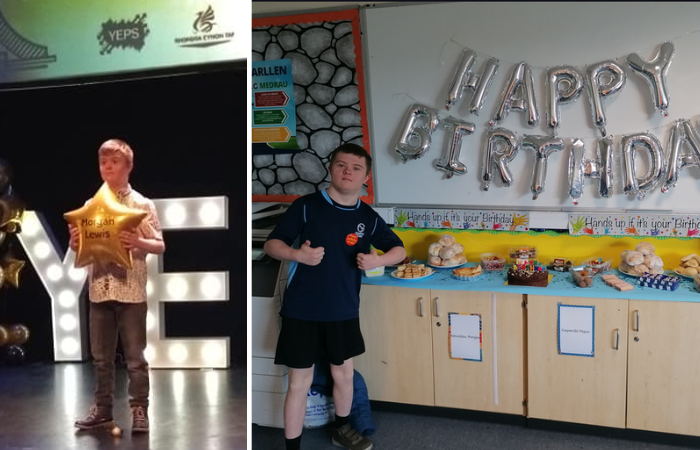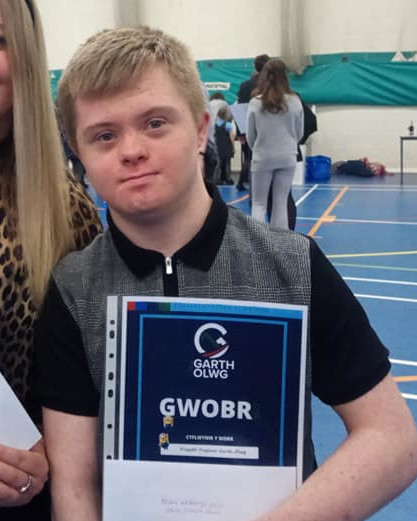Written by Amanda, Morgan’s mother
Morgan was born when his brother Jacob was two and a half years old, shortly after he had joined Meithrin (Welsh language pre-school). Having children close in age, I had imagined them both attending the same school and doing things together. The diagnosis of Down’s syndrome made me question whether this was possible. I considered changing Jacob to English language school so that there may have been more of a chance to keep them together, but we decided it wasn’t fair on Jacob as he already had a group of friends. I wanted Morgan to be known in and be a part of his community.
Over the next two years we wrestled with the decision of which path to choose for Morgan. Special School or Mainstream? Morgan had followed in his brother’s footsteps and attended Meithrin. Professionals involved in his care were pushing us towards Special School. An extra pressure on our consideration was the fact that Morgan had been diagnosed with a significant hearing impairment, and a school with a unit for the deaf was also on the cards.
Then a major turning point came when we changed hospitals for audiology and it was discovered that his hearing impairment wasn’t too much of an issue. We decided to contact a few mainstream English language schools. Responses varied and our catchment school’s response didn’t feel very inviting.
We consulted the opinions of others far and wide, including Gillian Bird who was then at DownsEd, to discuss the possibility of sending Morgan to Welsh school. We felt that Makaton could help bridge the gap to understanding both languages. Gillian gave us the confidence to give it a go…we had nothing to lose.
We contacted the Head at Jacob’s primary school, booked an appointment and went armed to argue the case why Morgan should be allowed to attend. The Head as it turned out had a friend with a grown up son who has Down’s syndrome, and our arguments weren’t required. Arrangements were made for Morgan to commence school aged three.
We started out with the attitude that it was good while it lasted, but we never expected that he would stay with his year group all the way to sixth form!
Secondary school was another time to negotiate and we informed them of our wishes several years in advance. Initial feedback was that they just weren’t geared up to have someone like Morgan in the school. Fortunately for him, one of the senior team has a son who has Down’s syndrome and she helped her colleagues to see that it could work.

In no time at all Morgan became like a celebrity in school. The Head of Year who had originally told me that he couldn’t envisage Morgan going to the school, in no time at all had a very different opinion after he started. He told me: ‘You could be walking down the corridor having a bad day, bump into Morgan, then all of a sudden everything is alright again.‘ That’s the effect he had.

Through being part of that school, Morgan joined after school clubs and youth club run by the local authority. He became a big part of that too. At their annual awards evening, after being nominated by his Youth Club peers, Morgan was awarded a Shining Star Award. At the Year 11 prize giving evening, where peers collected their GCSE certificates and awards for achievement, Morgan was awarded by the Head dysgybl sy’n disgleirio (pupil who shone).
The Head explained that as professionals they aren’t allowed to have a favourite, but in this case, he felt that Morgan was ‘everyone’s favourite pupil‘.
I believe the ‘can-do attitudes’ of the school staff, coupled with Morgan’s personality, have led to this success story.
My advice is ‘if you don’t ask, you don’t get‘ and ‘if you don’t try, you’ll never know‘.
